The NAOF's audit and monitoring activities support the sustainability and stability of public finances and promote the transparency and cost-effectiveness of government. In this sustainability report, we disclose in greater detail how we act responsibly in society and how we reduce our own footprint.
1 Management’s review: We promote an open and sustainable society
Responsibility can be defined as the organisation’s liability for the impacts of its activities on the surrounding society, stakeholders and the environment. At the National Audit Office of Finland (NAOF), we recognise and assume our responsibility for our operating environment.
This sustainability report is based on the agreement concluded by the UN Member States on the Sustainable Development Goals (SDGs), which aim to safeguard the wellbeing of people in an environmentally sustainable manner. In our report, we have strived to identify the SDGs that we can promote through our own actions: sustainable and stable public finances, transparent institutions and an open and cost-effective public administration provide the prerequisites for an economically, socially and ecologically sustainable society.
Responsibility is at the heart of our work: by carrying out our core activities effectively we ensure sustainable management of public finances and an effective and transparent central government. For us, responsibility also means keeping in mind that we, too, are accountable for our own activities and knowing that we serve as an example for others. We always carry out audit and oversight activities comprehensively and conscientiously, within the limits of our audit rights. Efficient performance of our main tasks is the key element of our strategy, which entered into force at the beginning of this year.
We have made responsibility one of our three values alongside objectivity and courage. Our values steer our activities both within the NAOF and in relation to our stakeholders. Respect for others and openness also steer our work and ensure responsibility.
Sami Yläoutinen, Auditor General
2 The NAOF in brief: We produce reliable audit and oversight information
The National Audit Office of Finland is an independent external Supreme Audit Institution, which operates in affiliation with Parliament. We work to ensure responsible use of central government funds and transparency: we audit the legality and appropriateness of the state’s financial management, monitor fiscal policy and oversee political party and election campaign funding and the use of the Finnish Transparency Register. In addition, we process complaints and reports on irregularities concerning central government finances and financial management.
At the end of 2023, the NAOF had 151 employees. Our head office is located in Ruoholahti, Helsinki. We also have an office in Oulu. At the beginning of 2023, we changed over from a matrix-based organisation to a line organisation. The National Audit Office is headed by the Auditor General and organised in three units: the Audit Unit, the Monitoring and Oversight Unit and the Shared Services Unit.
We reformed the NAOF’s strategy in 2023, and during the strategy period starting in 2024, we will strengthen the NAOF’s accountability to Parliament and citizens through our audit and oversight work. We produce reliable and relevant information on topics significant to central government finances and financial management exercising our audit and oversight rights appropriately and according to plan. Through our activities, we support efficient and lawful government and promote productivity, economic efficiency and cost-effectiveness in the central government. Correct targeting of our audit and oversight activities is extremely important in the challenging circumstances of general government finances.
We monitor the implementation of the priorities and enablers of our strategy period by means of the NAOF’s impact and performance targets. Our values are responsibility, objectivity and courage. They steer our internal and external activities. We set our operational targets and indicators related to responsibility as part of the planning of our activities and finances.
3 The handprint of our activities: We have a comprehensive and responsible impact
We have identified the sustainable development goals that we have promoted in particular through our activities. SDGs 8, 16 and 17 are at the heart of our activities. Target 16.6., Develop effective, accountable and transparent institutions at all levels, in particular, is directly related to our main tasks defined in the law.
In the following, we will report on the promotion of the SDGs from the perspective of our different activities. Our different activities promote simultaneously more than one SDGs. The effectiveness of our activities in relation to the SDGs is based on the high-quality performance of our core activities and the achievement of our performance targets.
We support sustainable management of general government finances
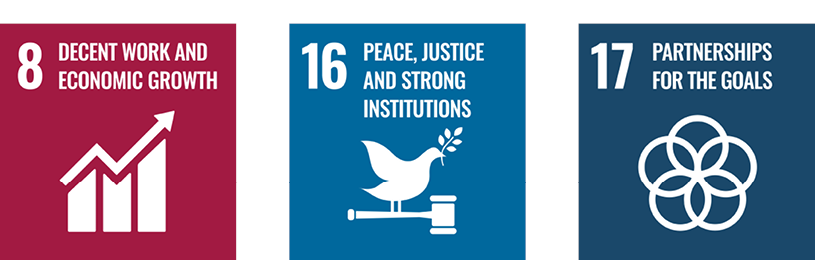
Sustainable and stable public finances are a prerequisite for an economically, socially and ecologically sustainable society. The basic task of the NAOF’s fiscal policy monitoring function is to support responsible management of public finances through monitoring compliance with fiscal rules, assessing the management of public finances and issuing opinions on these subjects.
We reported our main findings on the Government’s fiscal policy to Parliament in December 2023. Our assessment focused on the targets set in Orpo’s Government Programme to strengthen public finances and examined the measures presented in the General Government Fiscal Plan to achieve them. Based on forecasts, we found that it is unlikely that the targets set by the Government will be achieved and that the risk of growing indebtedness will continue unless further measures are taken.
We also assessed fiscal policy from the perspective of its appropriateness in view of the business cycle. In accordance with SDG 8, this is important for regulating total demand in the national economy and, for example, for managing employment. Last year, we assessed whether automatic fiscal stabilisers, which are important for a counter-cyclical fiscal policy, have become more efficient.
We also assess the reliability of the forecasts of the Ministry of Finance on a regular basis to verify the information base and transparency of fiscal policy. In 2023, we published a comprehensive statistical ex-post assessment of the accuracy and unbiasedness of fiscal forecasts while also continuing the annual assessment of the realism of the most recent forecasts.
CASE: The EU fiscal rules are reformed
One of our basic tasks is to monitor compliance with the fiscal policy rules that are essential for the EU’s common policy coordination. The aim of these rules is to safeguard the stability of general government finances from the macroeconomic perspective. The new EU rules enter into force in 2024. In the debate during their preparation, we have strived to promote a simpler framework and better consideration of the debt sustainability of each Member State. In order to promote a transparent and easy-to-understand fiscal framework, we described the elements of the new EU framework and its importance to Finland in our December report.
We ensure the efficiency, accountability and transparency of institutions
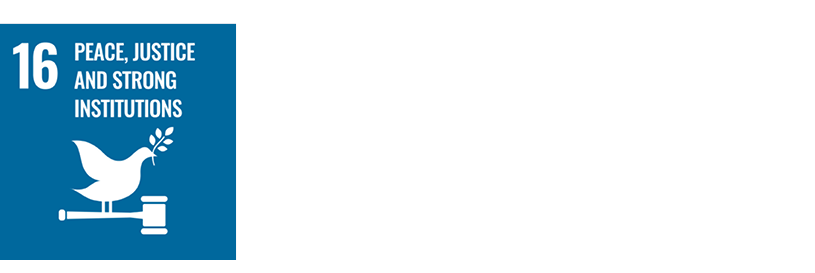
Under the Constitution of Finland, the NAOF’s task is to audit the management of central government finances and compliance with the state budget. In our financial audits, we verify the reliability and usability of the information on central government finances and the realisation of good governance. Financial audits also prevent corruption. In addition, financial audits promote the transparency of public activities and general government finances. Reliable information on central government finances and the state’s financial position contribute to sustainable public finances. Our expertise and views are formed in connection with our audit activities.
The significant challenges faced by Finland’s public finances highlight the importance of a well-functioning and cost-effective central government as well as sustainable and transparent use of public funds. The accountability of the central government ensures that public funds are used in compliance with the law and Parliament’s decisions. Our audit activities contribute to the achievement of these objectives.
We submit financial audit reports annually to the central government accounting offices. For the financial year 2022, we submitted 61 financial audit reports. We also submitted a financial audit report to three off-budget funds, three international organisations and two institutions of the Nordic Council of Ministers. In addition, we submitted a financial audit report on the final central government accounts and prepared a summary report on the financial audits.
In 2023, we published audit reports on a total of ten performance audits, two combined audits and three compliance audits. As our audits are targeted at the entire central government, our reports contribute broadly to several sustainable development goals.
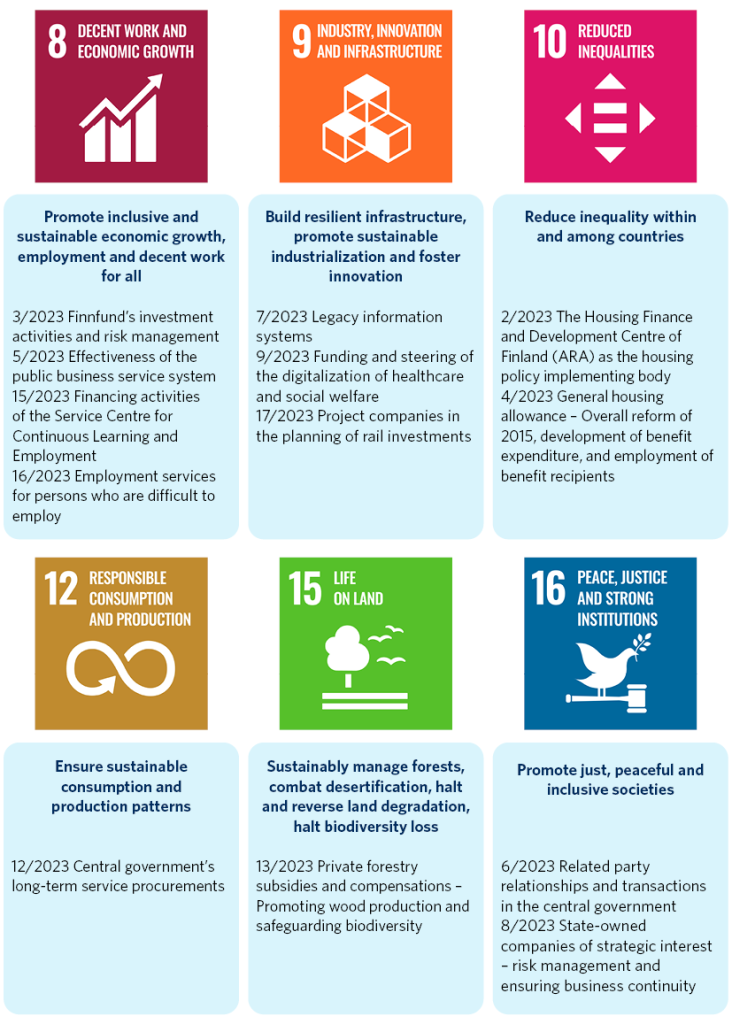
The National Audit Office monitors systematically the measures that public administration has taken on the basis of the conclusions and recommendations presented in its reports. We assess the implementation of the recommendations made in an audit report by conducting a follow-up usually about three years after the audit report was issued. Based on the follow-ups conducted, we found that about 81 per cent of our recommendations had been implemented either in full or in part when the target was 82 per cent. The number of assessed recommendations was 79. In 2022, 78 per cent of the recommendations had been implemented either in full or in part, while in 2021, the corresponding figure was 82 per cent.
| Indicator | Outturn in 2021 | Outturn in 2022 | Outturn in 2023 | Target for 2023 |
| Recommendations made in financial audits implemented either in full or in part (%) | 85 | 88 | 93 | 85 |
| Recommendations made in other audits implemented either in full or in part (%) | 82 | 78 | 81 | 82 |
| Audit and oversight reports in total (No.) | 87 | 86 | 90 | 89 |
| Follow-up reports (No.) | 27 | 16 | 22 | 21 |
The information presented in Table 1 is available in an accessible Excel format here.
Of the recommendations made in financial audits, 93 per cent had been implemented when the target was 85 per cent. The number of assessed recommendations was 312. Monitoring the implementation of financial audit recommendations is part of the financial audit process, and therefore no separate follow-ups are carried out. In 2022, 88 per cent of the recommendations made in financial audits had been implemented, while in 2021, the corresponding figure was 85 per cent.
We promote efficient and transparent public administration

The fight against corruption promotes efficient and transparent government. By overseeing political party and election campaign funding, the NAOF participates in the fight against corruption and bribery. In Finland, legislation aims to increase the transparency of political funding, provide information on candidates’ possible ties to third parties and limit campaign costs. Our oversight activities ensure that political party and election campaign funding comply with the relevant legislation and that citizens have up-to-date information on political funding in Finland.
We oversee that all actors within the scope of the law file an election funding disclosure. In addition, we oversee the accuracy of the information reported to us in connection with each election. We publish all the disclosures we have received as well as our election-specific oversight reports on our website. In 2023, we oversaw the election campaign funding in the 2023 parliamentary elections.
With regard to political party funding, we oversee that political parties and party organisations comply with the provisions of the Act on Political Parties. We oversee, for example, external support and disclosing it and publish documents submitted to us by political parties. In addition, we oversee the use of government grants to political parties, i.e. party subsidies. In 2023, we audited 52 party organisations. We also publish the findings of the oversight of political party funding on our website.
In addition, we promote efficient and transparent public administration by receiving complaints and reports on irregularities. Anyone can file a complaint about any action that is in violation of the state budget or otherwise unlawful from the perspective of the management of central government finances. Central government authorities must, without delay, report to us any irregularities in their activities. By receiving and processing complaints and reports on irregularities, we ensure that public administration operates transparently and is accountable for its activities.
The processing of complaints and reports on irregularities and the resolutions made in relation to them provide us with important information on shortcomings or irregularities found in the activities of public authorities. We also take the complaints submitted to us into account when planning our audit activities. If an irregularity found in the activities of a public authority were so serious that it would be regarded as an offence and if the authority itself did not take action, the NAOF would have to report the offence.
CASE: The Finnish Transparency Register has been introduced
The Act on the Finnish Transparency Register entered into force in Finland on 1 January 2024. Under the Act, the actors engaged in lobbying or lobbying consultancy targeted at Parliament or the ministries shall register with the Finnish Transparency Register. After registration, the actors shall report on their lobbying activities to the public register twice a year.
The purpose of the Finnish Transparency Register is to make the decision-making in Parliament and the ministries more transparent by increasing the transparency of unofficial lobbying. The Register aims to fight against inappropriate lobbying of central-government-level actors.
The National Audit Office acts as the registrar of the Finnish Transparency Register. For the actors subject to the disclosure obligation, we provide an online service for registration and submitting of disclosures. However, our main task is to guide and advise the disclosers in the application of the new legislation and oversee compliance with the disclosure obligation.
We support the audit of cross-border topics through cooperation
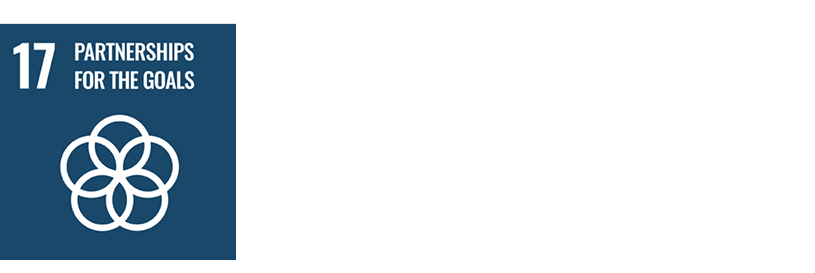
Cooperation with domestic and international stakeholders is also important from the perspective of sustainability. According to our strategy, we must act efficiently and transparently in order to succeed in our work. Our most important domestic stakeholders include the audited entities and the entire central government as well as Members of Parliament and the public officials of Parliament who utilise the audit and oversight information we produce. On our website, the media and the general public also have access to the reports we have prepared on the results of our audit and oversight activities. The key actors in our stakeholder cooperation also include the research and organisation fields. The development of our activities is supported by a statutory Advisory Board, which consists of representatives of our key stakeholders.
Participation in international cooperation and networks provides us with information and experience on both new methods and topical issues, which can support our audit and oversight activities and their planning. The importance of international cooperation is particularly emphasised in new, topical and cross-border topics. Our key cooperation partners include the international umbrella organisations of Supreme Audit Institutions (SAIs) EUROSAI and INTOSAI, the EU countries, the EU institutions and the SAIs of the Nordic countries. In 2023, we were active, for example, in the INTOSAI Working Group on Environmental Auditing (WGEA) and the INTOSAI Big Data working group, the EUROSAI working groups on environmental auditing and IT audit, and the Network on Fiscal Policy Audit, which operates under the EU Contact Committee and is chaired by us. In 2023, we joined the working group “EUROSAI support to the Accounting Chamber of Ukraine”.
In our role as the current chair of the INTOSAI WGEA, we promote the SDGs globally. We enable the sharing of experiences and best practices so that SAIs can develop the efficiency, accountability and transparency of public administration in their own countries.
One of the themes of the NAOF’s chairmanship is policy coherence. For example, fossil fuel subsidies are problematic in view of the effectiveness of climate policy and the cost-effective use of taxpayers’ money. The working group has committed itself to the sustainable development goals but has also highlighted the challenges related to these goals: it would be important to take into account not only the individual SDGs but also their interaction and the new themes and risks emerging from outside the SDGs adopted in 2015.
CASE: WGEA supports the environmental perspective in auditing
The INTOSAI WGEA promotes SDGs on a broad front. At present, the working group is focusing on climate change and biodiversity as well as the green economy. It aims to offer ambitious projects to advanced countries but also to support the audit of environmental and climate topics in SAIs that are only starting their work on these topics.
The international aspects of auditing have been conveyed to the academic world at an annual course organised at the University of Helsinki. The course has addressed, for example, the negative spill-over effects that the national measures taken for energy transition have in other countries. The WGEA Assembly held in Rovaniemi in January 2024 discussed how audit activities in different countries take into account the points of view of indigenous peoples.
Working in the WGEA has given us a good idea of the rapid development of reporting on the UN’s SDGs and the carbon footprint of organisations around the world and of the SAIs’ possible role in verifying the reporting.
4 The footprint of our activities: We are reducing our footprint
This chapter describes how we have taken into account the ecological, social and economic impacts of our activities. Our operational and financial plan for 2023–2026 sets quantitative targets for some indicators related to the footprint of our activities. With some indicators, the general aim is to reduce the footprint of our activities and to take negative impacts into consideration in the development of our activities.
Environmental responsibility
Office premises and energy
Our head office is located in Helsinki, in a property owned by Ilmarinen Mutual Pension Insurance Company. The building has the largest property-specific solar power plant in Helsinki. Since 2018, the property has had the LEED EB Gold certification, which steers the activities and environmental impacts of the property and its tenants in relation to energy efficiency, waste management and recycling. The electricity used in the property and the district cooling used for cooling the premises are fully carbon neutral.
| Energy consumption [1] | 2021 | 2022 | 2023 |
| Sähkö, MWh | 32 | 35 | 34 |
| Kaukolämpö, MWh | 115 | 109 | 109 |
| Kaukokylmä, MWh | 46 | 47 | 36 |
| Yhteensä, MWh | 193 | 191 | 179 |
The flexible remote work opportunities offered to our staff have been taken into account in the need for office space. Virtual meeting solutions and remote work have reduced the travel of our staff between the home and the workplace. The lease agreement of our Oulu office expires in 2024. We will take sustainable development considerations into account in the solution to replace the office.
Travel
Our officials’ travel comply with the central government’s travel strategy, which aims to reduce the environmental load. The amount of our air travel has decreased considerably from the years preceding the Covid-19 pandemic.
| Air travel [2] | 2019 | 2020 | 2021 | 2022 | 2023 |
| Kilometres | 1,192,414 | 193,500 | 12,481 | 192,149 | 273,352 |
| Emissions, CO2 eq./kg | 165,420 | 22,060 | 1,090 | 20,922 | 29,902 |
In travel, we favour public transport. Remote and hybrid meetings have become increasingly common in international cooperation as well. This contributes to sustainability through reducing travel.
Procurement
In our procurements, we primarily utilise contracts tendered by Hansel Ltd, the central purchasing body of public administration. Our procurement manual also requires that we take the environmental impacts, ethical issues and quality of the procurement into account throughout the life cycle of the contract.
Based on our purchase invoices, the product and service groups that were the biggest contributors to our carbon footprint in 2023 were the rental of buildings and apartments (0.15 million CO2 eq./kg), software and intangible rights (0.08 million CO2 eq./kg), ICT services (0.06 CO2 eq./kg) and occupational health services (0.05 CO2 eq./kg).
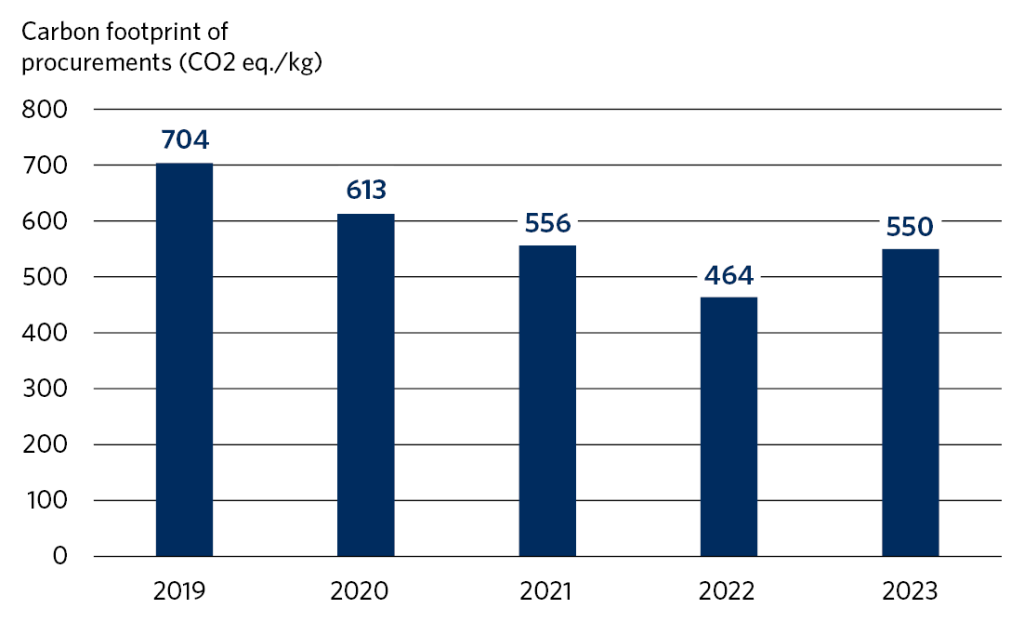
Social responsibility
We monitor the work satisfaction of our staff annually. In 2023, the job satisfaction index rose from 3.41 in the previous year to 3.78. The leadership index, in turn, rose from 3.18 to 3.78. The objectives set for our wellbeing at work are determined annually. The possibility of flexible working has in several years appeared as an issue that promotes wellbeing at work and that should be maintained.
The sickness absences of our staff decreased in 2023 and were clearly below the central government average. In competence development, we achieved our target of using on average five working days per person for education and training.
Our Committee on Equality and Non-Discrimination estimated that the measures presented in the previous gender equality plan had succeeded fairly well and drew up a new equality and non-discrimination plan for 2023–2026. The results of an equality and non-discrimination survey and a pay survey were used as support in the assessment.
| Indicator | Outturn in 2021 | Outturn in 2022 | Outturn in 2023 | Target for 2023 |
| Job satisfaction index (1–5) | 3.3 | 3.4 | 3.8 | 3.5 |
| Leadership index (1–5) | 3.0 | 3.2 | 3.8 | 3.3 |
| Absences due to sickness (days/person-year) | 4.2 | 6.6 | 4.1 | fewer than 7.9 |
| Time spent on education and training (days/person-year) | 4.8 | 2.5 | 5.0 | 5.0 |
Financial responsibility
A total of EUR 20.7 million had been allocated to our activities in 2023. The NAOF’s total expenditure increased by approximately EUR 0.5 million from the previous year, which was mainly due to the increase in personnel expenses. Personnel expenses account for the majority of the NAOF’s total expenditure (about 82%). As an indicator of the economic efficiency of our activities, we reported the cost of a working day spent on core activities, which increased slightly from the previous year but was well below the quantitative target. As a rule, the increase in expenditure was due to the increase in salary expenses and the increase in working hours spent on core activities.
| Indicator | Outturn in 2021 | Outturn in 2022 | Outturn in 2023 | Target for 2023 |
| Cost of a working day used for core activities (€) | 842 | 788 | 802 | 825 |
As part of responsible financial management, we decided to cancel EUR 1.0 of the unused operational expenditure appropriation. In 2022, we cancelled EUR 1.5 million. We are also committed to reducing, on our own initiative, the NAOF’s operating expenditure appropriation by EUR 0.3 million by 2027 according to the guidelines issued by the Parliamentary Office Commission last year.
According to our assessment, our cost-effectiveness developed positively in 2023. Based on the achievement of the targets set for our key figures, we achieved our performance targets either well or fairly well. More detailed information on the cost-effectiveness and efficiency of our activities is available in our final accounts.
The information in Tables 2, 3, 4 and 5 is available in an accessible Excel format here.
5 Report drafting process
This report has been drawn up for the second time in the history of the National Audit Office after a two-year break. As regards the sustainable development goals, we selected three SDGs which we addressed in this report. However, as stated in the report, some of the tasks of the National Audit Office address several SDGs at the same time. As sustainability indicators, we have selected such existing indicators applied to the NAOF’s activities and finances for which we have set targets as part of the regular process of planning our activities and finances.
We drew up the report at the management’s request, and the reporting task is based on the target set in our operational and financial plan. The report texts have been compiled by the staff of different units, and the preparations have been coordinated by the Communication and Financial Services groups. Before its adoption and publication, the sustainability report was discussed in the NAOF’s management group meeting on 24 April 2024.
[1] The electricity consumption is presented according to the consumption of the Helsinki office. Other energy consumption has been calculated by dividing the consumption of the property by the share of the NAOF’s office premises in the whole area of the property. The NAOF’s share of the total area is 2.7%. The figures do not include the energy consumption of the Oulu office. The share of the Oulu office of the total consumption is very small.
[2] The figures are based on the data provided by our contract travel agency, CWT Finland Ltd.
[3] The data are based on a calculation model developed by the Finnish Environment Institute (SYKEra 15/2019). The estimates of the carbon footprint of the procurement categories are based on the average carbon footprints of the products on the Finnish market and do not necessarily correspond to the actual carbon footprint of the individual procurements.


